Pest Control Services Ipswich
Safe and affordable pest control services.
Jets Pest Control Ipswich provides a wide range of pest control services to keep your home safe and free from unwanted pests. Our team of experienced professionals uses high-quality products and advanced techniques to ensure your satisfaction and safety. Enjoy a pest-free home. Book now!
- We guarantee our service. If we don’t meet your expectations, we'll return and make it right.
- A personalised approach. We’ll get an understanding of your specific concerns before we get to work.
- An experienced team. You’ll get unmatched expertise when you team up with Jets Pest Control.
Request a booking online 24/7 or call us now!
You can save over $100 when you book a residential pest control service for $249 and a regular visual termite inspection for $259 together! T&Cs apply.
- We guarantee our service. If we don’t meet your expectations, we’ll return and make it right.
- A personalised approach. We’ll get an understanding of your specific concerns before we get to work.
- An experienced team. You’ll get unmatched expertise when you team up with Jets Pest Control.
What household pests do we treat?
Are you tired of dealing with pests in your home or business? Look no further than Jets Pest Control Ipswich! Pests can cause various issues, such as costly repairs, disrupted sleep, contaminated food and drinks, and potential health risks. That’s why relying on professional pest control services is essential to keep your property pest-free.
Our team at Jets Pest Control Ipswich consists of experienced and highly trained technicians who use only the best products and techniques to ensure your property is pest-free. We offer comprehensive protection against a wide range of pests, and are fully insured and compliant with all State and Federal regulations.
Say goodbye to pest problems and enjoy a pest-free environment by booking a service with Jets Pest Control Ipswich today!
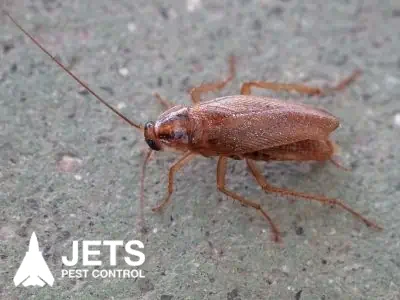
Cockroaches are pests that humans frequently encounter, and these insects are known for their ability to transmit diseases to people. Due to this, they are considered a severe health concern. Cockroaches contaminate food products, utensils, and preparation areas with droppings, cast skins, empty egg cases, dead bodies and vomit on surfaces. They are often considered disgusting, and their presence can cause an unpleasant odour when a large infestation occurs due to secretions from their mouth and cuticles.
Cockroaches can also cause allergic reactions in some people. Sensitive individuals may experience positive skin reactions, while asthmatics may suffer from asthma attacks when exposed to the allergen. The allergen can be ingested with contaminated food or inhaled when dry feces become part of the dust. It is also worth noting that cockroaches have been known to bite, although this is rare.
There are several species of cockroach, including German, American, Australian, Smoky Brown, Brown-banded, and Oriental cockroaches.
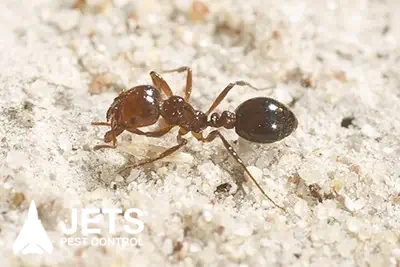
Ants are insects living in social groups in permanent nests, typically found in soil, wood, or rocks. They are common intruders in and around homes and can be seen around foundations, walls, roof voids, kitchens, lawns, gardens, decaying timbers, and rockeries. Worker ants are usually seen foraging for food and water, travelling on well-defined scent trails with pheromone secretions. Ants rely on their sense of smell, taste, hearing, touch, or sight for communication and direction.
Ants can be a significant problem in and around homes as they are considered nuisance pests. Their excavations can leave unsightly small mounds on garden paths, balconies, skirting boards, and architrave bases. In some cases, the excavations under paths can even crack concrete. Trailing ants are unsightly, and they can also present a health risk. Ants can carry disease organisms that cause dysentery and pathogenic bacteria like Salmonella in their digestive tract or on their bodies.
Ants are known to scavenge in kitchens, garbage bins, and other food-handling areas and may also be attracted to dog faeces or other potential sources of disease organisms. Some ants can also bite and sting people, making knowing their potential for transmitting diseases essential.
There are different types of ants, including Small Brown Ants like the Argentine Ant, Coastal Brown Ant, Pharaoh’s Ant, Odorous Ant, and Singapore Ant. Tiny Black Ants include White-footed House Ants and Black House Ants, while Larger and Other Ants include Carpenter Ants, Green-headed Ants, Meat Ants, Jumper Ants, Bulldog Ants, and Red Imported Fire Ants.
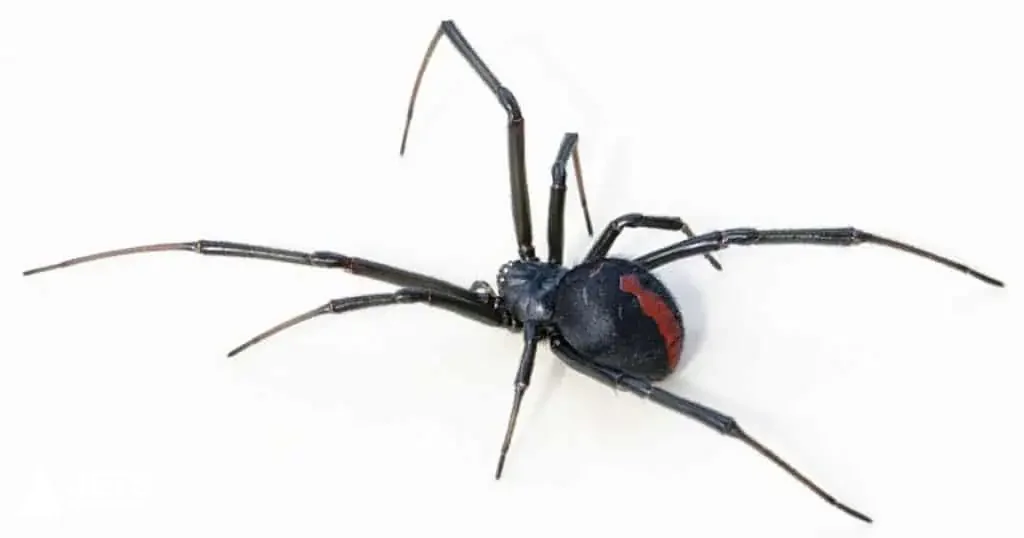
Spiders are not insects but can be a significant problem for many people, causing considerable discomfort. Just the thought of spiders can send shivers down the spine of some individuals. Many people struggle with sharing their living space with them, which can be a constant source of fear and irritation in their homes. Only a few people can comfortably endure their presence in and around their homes.
Although most spiders are not dangerous, they are considered a severe nuisance primarily because of their webbing. They are typically drawn to warm areas with low disturbance, such as in and around air conditioning units, and high up on cornices and eaves of a house. We can check for early signs of infestation and act quickly with a highly effective and targeted treatment for your home.
Please note that controlling ground-dwelling and hunting spiders relies on direct contact of the spider with the insecticide.
Here are some common house spiders:
- Redback Spider
- Black House Spider
- Red House Spider
- Cellar Spiders (Daddy-long-legs)
Here are some hunting spiders:
- White-tailed Spider
- Huntsman Spider
Here are some ground-dwelling spiders:
- Funnel Web Spiders
- Trapdoor Spiders
- Mouse Spiders
- Wolf Spiders
Here are some garden spiders:
- Garden Orb-Weaver Spiders
- St. Andrew’s Cross Spider
- Leaf-curling Spider
- Golden Orb-Weaver Spiders
- Jumping Spiders
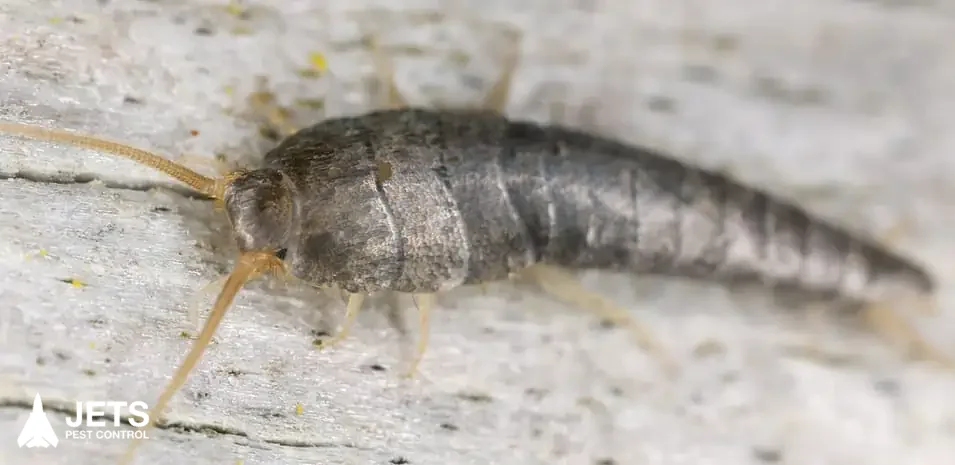
Silverfish are a type of primitive, agile, fast-running, scaled-covered wingless insects often found in your home’s undisturbed areas, such as bookcases, storage rooms, and roof voids. They have a silvery appearance, and their bodies taper at the rear, making them fish-like. They have long, slender antennae with three long appendages noticeable from the rear.
While silverfish are not a problem in small numbers, a large infestation can cause severe damage to your property. These insects thrive in moist environments, so fixing any leaking pipes or taps is essential. Silverfish are destructive feeders and can cause significant damage to items such as books, photos, paintings, and more. They will consume any household items containing starch or cellulose.
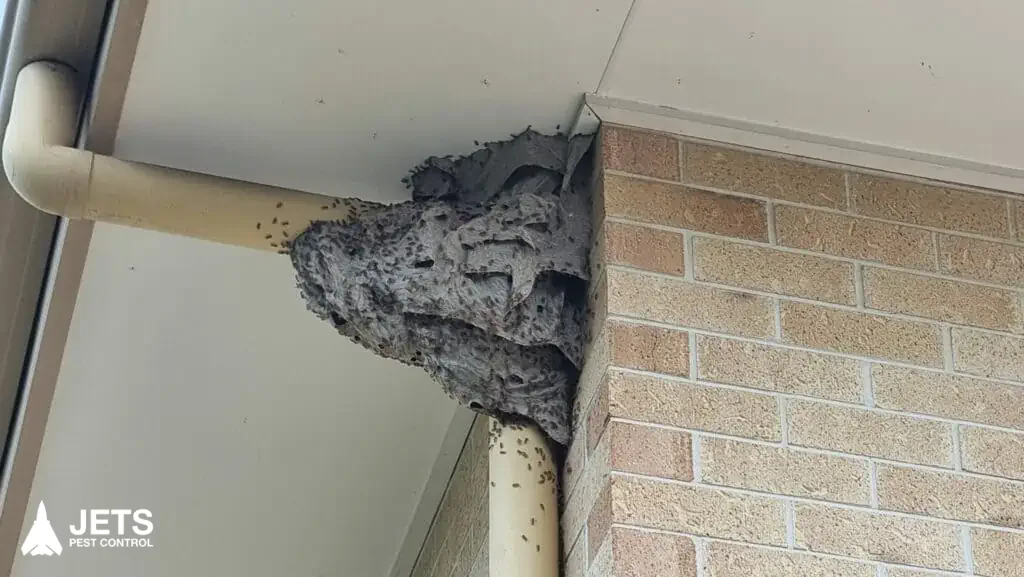
Homeowners in Ipswich must be cautious of Native Paper Wasps, as their stings can be painful. These wasps have a potent venom that can cause intense pain, swelling, and redness around the sting area. In some cases, people may also experience severe allergic reactions that require immediate medical attention. Therefore, it is crucial to take necessary precautions to avoid disturbing these wasps and seek professional help if there is an infestation or if you get stung. Any wasp pest control should be done carefully.
Mud-dauber and Potter’s wasps are also common around Ipswich homes. They can deliver a painful sting, but attacks are rare. You may catch them feeding on flower nectar, but they often fly with a paralyzed spider in their jaws to feed their larvae in a mud nest.
Some of the wasp species found in Ipswich include Brown Paper Wasps (various species), Mud Dauber Wasps, and Potter Wasps.
Fleas are small, bloodsucking insects that can be a real problem in homes, particularly with pets. They feed on pets, livestock, birds, and people, causing severe irritation and transmitting diseases. Under favourable conditions, they can reach plague proportions, which are challenging to control without professional help.
To keep fleas at bay, regular flea treatments for pets are your front line of defence. So, talk to your vet about the best options available. Fleas thrive in moist, humid, and shady areas like woodpiles and tall grass. You will find them in and around pets’ bedding and carpets in your home, and your pet may pick them up in the yard, at dog parks, or during a walk around the neighbourhood.
There are different species of fleas, including the Cat Flea, Dog Flea, Human Flea, and Oriental Rat Flea.
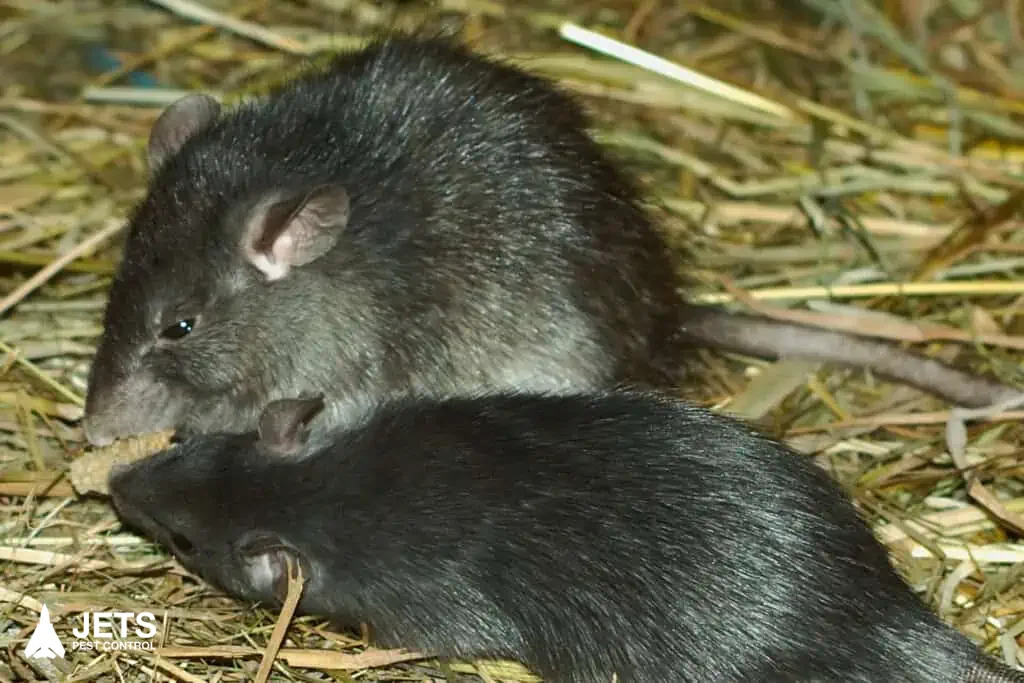
Rats and mice are a major problem for people as they feed on the food we store and carry diseases that can enter our homes. These rodents are well-suited for living near us, as they share our food and shelter. Throughout history, rodents have caused significant loss of food and human life due to their ability to transmit diseases to people. These smart and cautious pests have successfully adapted to living in urban environments for years.
Rats and mice are highly adaptable creatures that can eat almost anything. They are agile and mostly active at night, but they may also roam during the day if the population is large or the risk of danger is low. Rats and mice are excellent climbers, capable of climbing rough walls, pipes, and trees to access your home.
Are you worried about rats and mice infesting your home? These rodents can cause serious damage to your health and your property, resulting in loss of income and expensive repair bills. Controlling rodents is essential to prevent the spread of various diseases and illnesses they are known to carry.
Types of rodents that you may encounter are:
- Brown Rat (also known as Norway Rat)
- Black Rat (also known as Roof Rat or Ship Rat)
- House Mouse
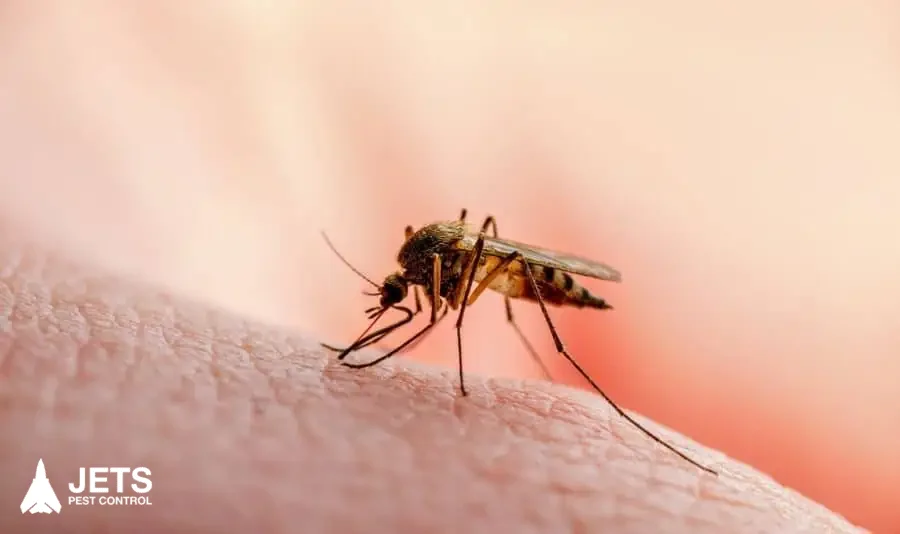
Mosquitoes significantly threaten the health and comfort of people and animals worldwide. They cause millions of deaths every year by transmitting diseases that are lethal to humans, such as Dengue fever, Australian encephalitis and Ross River fever, among others. In Australia, mosquitoes are active during hot and wet summer months, and they can be incredibly irritating by biting humans and animals. The term biting refers to adult female mosquitoes’ piercing and sucking feeding actions. Mosquito larvae can develop in any stagnant water found at home, including garden ponds, pot plants, drains and gutters.
To control mosquitoes effectively, you must prevent breeding grounds by removing any stagnant bodies of water you can. Mosquitoes can disrupt your life and social events with their persistent buzzing and bites that can cause allergic reactions. Some of the mosquito species found in Australia are the Common Australian Mosquito, Dengue Mosquito, Domestic Container Mosquito, Saltmarsh Mosquito, Grey-striped Mosquito, Common Banded Mosquito, and Brown House Mosquito.
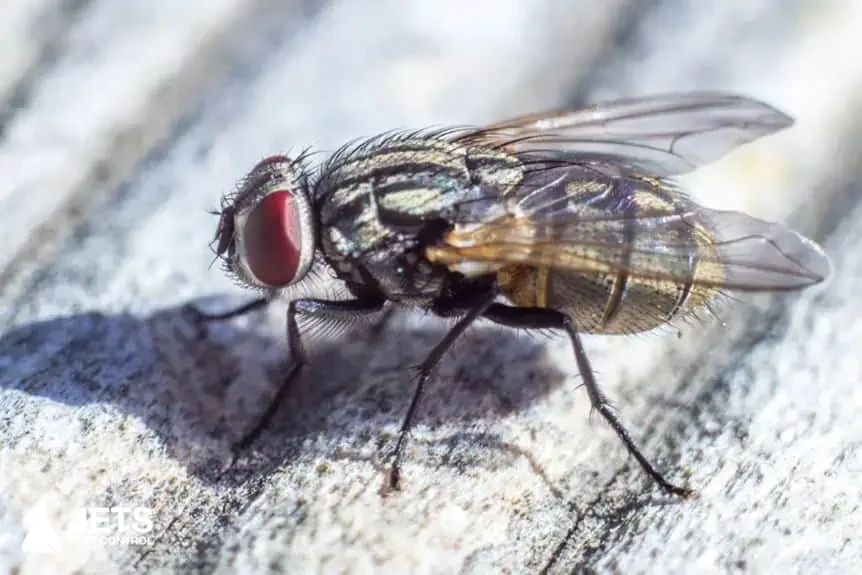
Flies are a major nuisance in every way and can pose serious health risks in your home. The sheer number of disease-causing microorganisms that flies can carry on or in their bodies is enormous. They can invade your home and spread diseases like Salmonella and E. coli, and some species are even known to bite humans and animals.
Flies are highly mobile and can move freely from decaying waste or excrement to the food we eat and the surfaces we prepare it on. They contaminate food, spread diseases, cause allergic reactions, and annoy people and pets, particularly during the warmer months. A small fly problem, if not addressed, can become a significant infestation in just seven days.
Proper fly control is a complex process, and we use several methods to identify and control breeding sites. Hiring a professional is the most effective way to prevent flies from entering your property.
Types of flies include:
- Housefly
- Bush Fly
- Lesser Housefly
- Stable Fly
- Blowflies
- Flesh Flies
- Vinegar Flies
- Cheese Skipper Fly
- Moth Flies
- Biting Midges (also known as Sandflies)
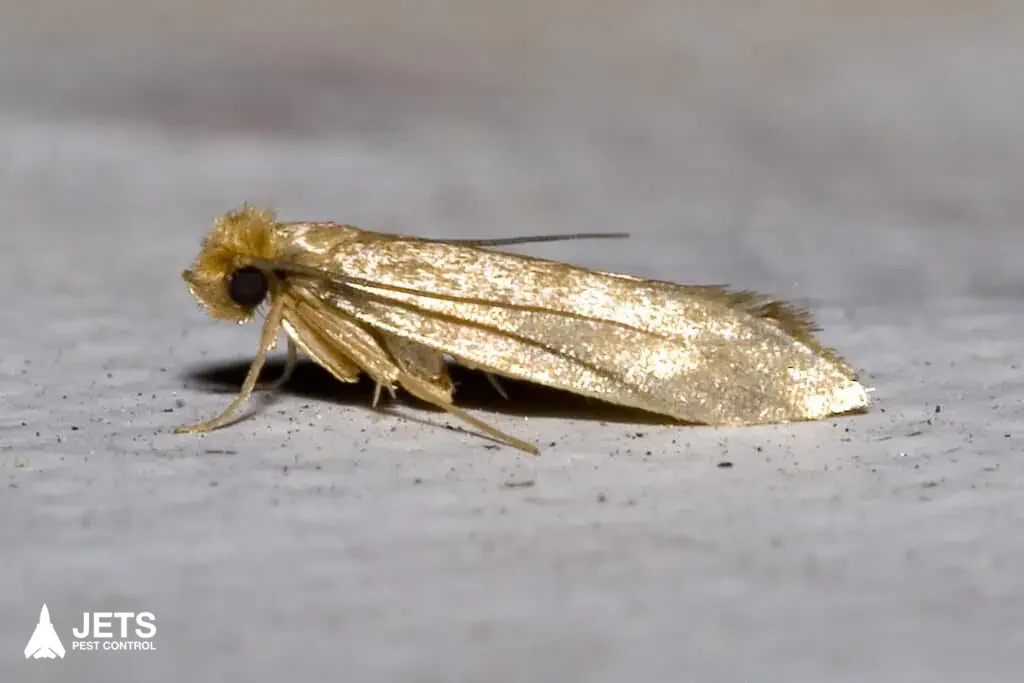
Protecting your wool and other natural materials from webbing clothes moths is essential. These moths’ larvae devour fabric by feeding on the keratin in natural fibres such as furs, silk, felt, feathers, and hair. Clothes moths prefer to live in dark areas like wardrobes and fabrics, where they can avoid light. Unfortunately, when you notice them, they’ve already caused significant damage to your coats, sweaters, blankets, carpets, pillows, and other similar items.
Webbing clothes moths and their cousin, casemaking clothes moths, are notorious household pests that can cause severe damage. If you’re experiencing an infestation, it’s essential to seek the help of a highly trained Ipswich pest control technician. There are three types of clothes moths: Casemaking Clothes Moth, Webbing Clothes Moth, and Tapestry Clothes Moth.
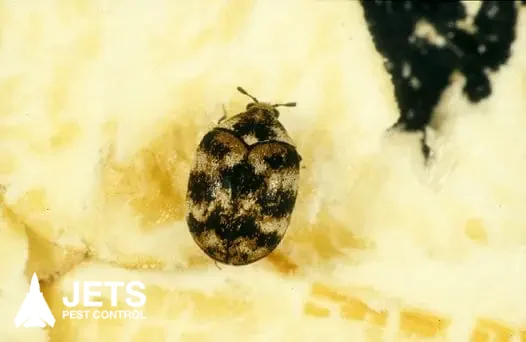
Carpet beetles are well-known for damaging animal-based materials. There are numerous species of carpet beetles in Australia, but the most commonly encountered ones are the variegated and black carpet beetles. Carpet beetles are more widespread than clothes moths because they have lower humidity tolerance. Only the larvae of carpet beetles are destructive to natural materials, but they attack a more comprehensive range of materials than clothes moths.
Carpet beetle larvae can feed on or in wool, fur, hair, silk, clothes, fabrics, carpets, rugs, underfelts, felts, insulating materials, dried insect specimens, animal carcasses, bee and wasp nests, and stored foods such as dried meats, seeds, grains, and cereals. The presence of flying or crawling adult carpet beetles strongly indicates an infestation. Sightings of damaged materials, sand-like larval droppings, bristly cast skins, and even live larvae can confirm their activity.
If you have an infestation of carpet beetles and require treatments, it is best to engage the services of a highly qualified pest control technician in Ipswich. The species of carpet beetles commonly found in Australia are the Variegated Carpet Beetle, Black Carpet Beetle, Australian Carpet Beetle, and Furniture Carpet Beetle.
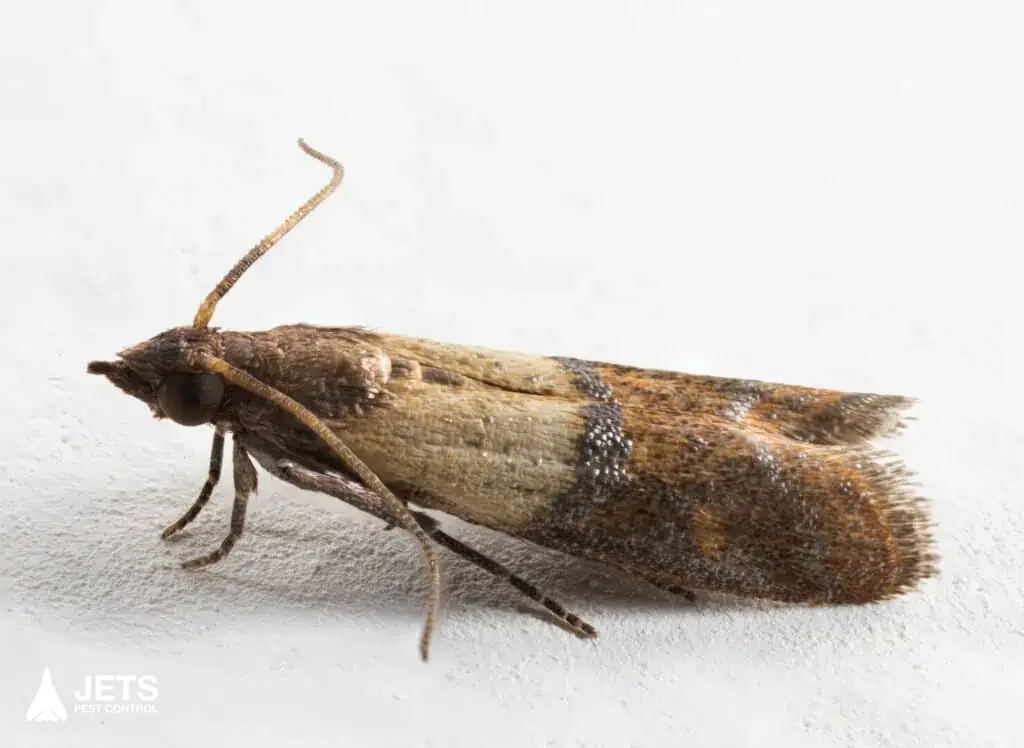
It’s common to find small weevils and moths infesting our kitchen pantry. These pests are collectively known as stored food pests. Infestations usually occur in food packages stored for long periods, like flour and rolled oats, but they can also be found in Ratsak baits in the ceiling or sub-floor areas. These pests breed in the food packets, and their population grows by accumulating crumbs and other food materials under cupboards, white goods, and furniture.
If you find an infestation of pantry moths or weevils, it’s best to immediately prevent them from contaminating your stored food with live or dead insects, cast skins, and droppings. Treating the packets with an aerosol or surface spray is one way to handle it. If you’re dealing with an infestation that you can’t handle, it’s best to call a professional.
To prevent the infestation from happening in the first place, make sure to keep food susceptible to pantry moths and weevils stored securely to control access. You can also treat the packets by microwaving them for a few minutes or throwing them away in a garbage bin.
Here are some of the pest species that you should look out for:
- Rice Weevil
- Granary Weevil
- Maize Weevil
- Common Hide Beetle
- Hide Beetle
- Larder Beetles
- Warehouse Beetle
- Khapra Beetle
- Flat Grain Beetle
- Dried Fruit Beetle
- Sawtoothed Grain Beetle
- Rust-red Flour Beetle
- Confused Flour Beetle
- Broadhorned Flour Beetle
- Longhorned Flour Beetle
- Yellow Mealworm
- Lesser Mealworm
- Small-eyed Flour Beetle
- Cadelle
- Angoumois Grain Moth
- Indian Meal Moth
- Mediterranean Flour Moth
- Tropical Warehouse Moth
- Tobacco Moth
- Raisin Moth
- Meal Moth
- Larger Wax Moth
- Flour Mite
- Seed Mite
- Cheese Mite
- Straw Itch Mite
See What Our Clients Are Saying on Google!
Eradicate pests with Jets Pest Control. Get started with a free quote.
We’re the pest control experts here in Ipswich. Protect your home — fill in the form to get started with a free quote.
